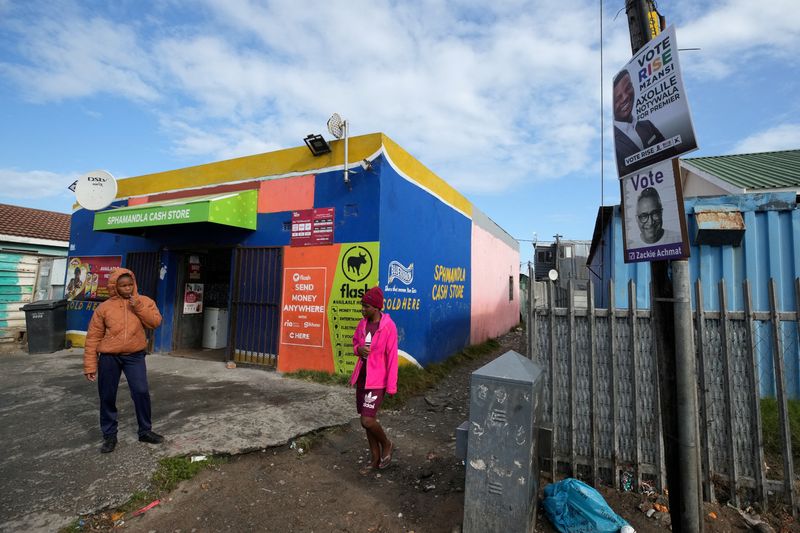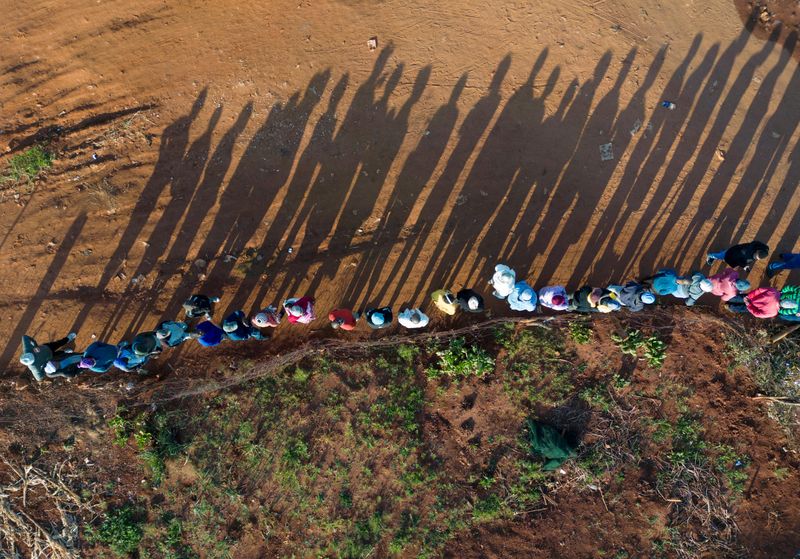By Bhargav Acharya and Anait Miridzhanian
MIDRAND, South Africa (Reuters) -The African National Congress looked set to lose the parliamentary majority it has held for 30 years, partial election results on Thursday showed, as voters punished the former liberation movement for years of decline in South Africa.
While the party of the late Nelson Mandela looked likely to remain the largest political force, such an outcome would push it into a coalition with other parties for the first time in the country's post-apartheid history.
With results in from 42.1% of polling stations, the ANC had garnered 42.7% of votes in Wednesday's poll. It won 57.5% of votes in the previous election in 2019.
Were that trend to hold, the ANC would likely struggle to cobble together a majority through alliances with small parties, leaving it a potential choice between three bitter rivals.
"The ANC is in a trilemma," said political analyst Sizwe Mpofu-Walsh.
The partial results released by the electoral commission put the pro-business Democratic Alliance (DA) in second place on 23.6%.
uMkhonto we Sizwe (MK), a new party led by former president Jacob Zuma, was at 10% and eating into ANC support, particularly in KwaZulu-Natal - his home province and a traditional stronghold of the ruling party.
MK had also overtaken the radical left Economic Freedom Fighters (EFF), currently the third biggest party in parliament, on 9.5%.
Zuma was forced to quit as president in 2018 after a string of scandals. He has since thrown his weight behind MK - named after the ANC's armed wing from the apartheid era - but he was barred from standing for a seat in parliament due to a prison sentence.
"MK is the reason why the ANC is getting less than 50%," Oscar Van Heerden, senior research fellow at the Centre for African Diplomacy and Leadership at the University of Johannesburg, told Reuters.
The ANC has won every national election since a landmark 1994 vote ended white minority rule and brought Mandela to power.
But the last decade has seen the ANC wracked by repeated corruption scandals while South Africans have watched the economy stagnate, unemployment and poverty climb and infrastructure crumble, leading to regular power outages.
'DISASTER FOR SOUTH AFRICA'
Pollsters and two of the country's three main broadcasters predicted that the final results would confirm that the ANC had lost its majority.
Mosotho Moepya, the chairperson of the Independent Electoral Commission, warned against reading too much into the early results, however.
"At the moment we are trying to deal with a picture that is half-baked, maybe not even half-baked. It's still in the oven," he told a news briefing at the national counting centre.
Under South Africa's proportional voting system, parties' shares of the vote determine the number of seats they get in the National Assembly, which then elects the next president.
That could still be the ANC's leader, incumbent President Cyril Ramaphosa. However, an embarrassing showing at the polls risks fuelling a leadership challenge.
Investors and the business community have voiced concern over the prospect of a coalition with the EFF, which is calling for the seizure of white-owned land and the nationalisation of mines and banks, or with Zuma's MK.
The ANC shares some policy stances with the EFF and MK. Both Zuma and EFF leader Julius Malema are former ANC members who fell out with its leadership.
Though the DA has vowed to oust the ruling party, its leader John Steenhuisen has not ruled out a partnership to block what he has called a "doomsday coalition" with the ANC bringing the EFF or MK into government.
"That would spook investors. It would tank the economy. It would be a disaster for South Africa," Helen Zille, chairperson of the DA's federal council, told Reuters.
But she added that the DA had not entered coalition talks with any parties.
The rand fell more than 1% against the U.S. dollar on Thursday while the wider equity index dropped almost 1.9%. Local and international bonds also came under pressure.
Speaking to Reuters, ANC Deputy Secretary-General Nomvula Mokonyane said she had been surprised by the results in KwaZulu-Natal, where MK was running well ahead of the ANC.
"It's still early, we want to give ourselves the space to reflect. The race is not yet over," she said.
In contrast, the MK party was triumphant, slamming what it called "Ramaphosa's dismal regime".

By law, the electoral commission has seven days to declare full results, but in practice it is usually faster than that.
The new parliament must convene within 14 days of final results being declared and its first act must be to elect the nation's president.
